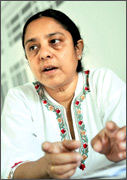Breastfeeding - Giant step towards a healthy nation
Research has proved that exclusively
breastfed babies turn out to be healthier and more intelligent. In view
of World Breastfeeding Week (August 1 to 7) Associate Professor in
Paediatrics and Head of the Department of Paediatrics at Sri
Jayawardenepura University Prof. Dulani Gunasekera outlines the
advantages, misconceptions and problems associated with breastfeeding
|
Main advantages of breastfeeding
 * Best nutrition for the baby * Best nutrition for the baby
* In ideal composition
* Tailor-made
* Promotes immunity
* Sterilized
* Economical
|
Breast milk is extremely important to a new-born in becoming a
physically and emotionally healthy individual later in life. It protects
infants from infections, boosts immunity while providing the best
nutrition required. Therefore, raising awareness is vital to promote
breastfeeding and improving health at large, Prof. Gunasekera said.
Advantages:
There are several advantages of breastfeeding.
1. Breast milk is the best nutrition for the baby. It contains all
the nutrients that promote growth. The composition of the breast milk is
ideal as all nutrients are in ideal composition to suit the requirement
of a baby. The composition could differ from person to person, but each
mother produces milk that is best suited for her baby. For instance, a
pre-term baby’s nutritional requirement differs from that of a baby born
at term. So the composition of human milk will naturally be adjusted
accordingly.
2. Tailor-made Breast milk is nature’s gift to a baby as it is the
naturally available nutrition for human babies. No other formulae can
replace the nutritional requirement of an infant as ideally as breast
milk does.
3. A living substance Breast milk is not only a wholesome food but
also a living substance that helps babies stay healthy in the long term.
Apart from main nutrients like carbohydrate, protein, calcium and all
vitamins and minerals required for an infant’s growth, breast milk also
contains antibodies and other substances that help fight infections,
illnesses and boosts immune systems
4. Sterilized Breast milk is a ready-made naturally sterilized food
for the baby. Therefore it leaves no room for infections.
5. Economical
It is available free and therefore affordable to any mother.
Recommendations on breastfeeding
There are globally accepted recommendations in breastfeeding.
* Early initiation
If the mother and baby are healthy, breastfeeding should start within
half an hour after delivery. Early breastfeeding initiation promotes
successful continuation of breastfeeding.
According to research early initiation of breastfeeding helps
strengthen mother-baby bonding initially and in the long term.
* The baby should be exclusively breastfed for the first six months
from birth.
Exclusive breastfeeding
 |
|
Breast milk is indispensable for an
infant’s growth. File photo |
Exclusive breastfeeding means the baby is given only breast milk
during the initial six months. No other substance (not even water) is
given to the baby during this period.
Research have found that exclusively breast-fed babies’ IQ level is
superior to that of artificially-fed babies.
-Introducing solid foods after six months
Breastfeeding should continue after the initial six months up to two
years along with solid foods.
Breastfeeding may continue even after two years after the baby is
born but it is optional.
UNICEF has introduced global guidelines on breastfeeding to raise
awareness on the subject. The Baby-Friendly Hospital Initiative (BFHI)
is successfully conducted in Sri Lankan hospitals as well. There has
been a significant improvement in exclusive breastfeeding in Sri Lanka
following this move, Prof. Gunasekera remarked.
Misconceptions in breastfeeding
There are numerous misconceptions or myths that are associated with
breastfeeding. Most of these are interrelated with the culture and
social set up. Therefore it is quite a difficult task to dismiss these
myths at once.
Fortunately, with growing awareness Sri Lanka is gradually shedding
these myths, she said.
One such misconception is that only healthy and nutritionally-fit
women can breastfeed effectively. This is not true.
Even malnourished mothers can breastfeed as the composition of the
breast milk does not change in spite of the mother’s nutritional status.
However, if she does not recover her health her status may further
deteriorate.
A balanced diet is essential for the mother but it does not have a
direct impact on producing milk as the composition is adjusted according
to the requirement of the baby.
The size of the nipple is important - this is another misconception.
Make sure that the baby is properly latched onto the areola (the dark
area around the nipple) for a proper suckling.
Another myth is the initial milk is harmful to the baby and therefore
should be discarded.
The initial flow of breast milk is known as Colostrum and it is
yellowish.
This milk is very high in nutritional and immunological value. It is
important that the baby gets it.
Other misconceptions such as; bathing before breastfeeding thins the
milk flow, male infants need more milk than females and eating certain
foods to produce a better flow of milk are some of other popular myths
in our culture, the Professor noted.
Current principles in breastfeeding
Without adhering to those misconceptions breastfeeding women can
follow certain principles in breastfeeding their babies.
Feed on ‘demand’
Unlike in the past breastfeeding on a timetable (breastfeeding once
in every two hours and so on) is no longer accepted. Mothers are advised
to breastfeed whenever the baby is crying for milk. There should be no
restrictions as to the duration of the feed and the number of feeds per
day.
The baby could be breastfed any number of times it demands milk; the
duration of a feed depends on the baby’s requirement.
 |
|
Prof. Dulani Gunasekera MD, FRCP (Lon)
Picture by Rukmal Gamage |
Problems in breastfeeding
* Cracked nipples
This could arise when the baby’s mouth is latched onto the nipple and
not the areola. Do not stop feeding if you have cracked nipples. Again,
make sure that the baby is properly latched onto the areola. As a
remedy, apply a little breast milk on the nipple.
* Breast engorgement
Milk getting collected inside the breasts leads to painful swelling
of breasts. This may create an uncomfortable condition for the mother.
Get the baby to suckle the milk of the affected breast.
* Lack of milk
This is a common complaint of mothers breastfeeding their first baby.
The flow of milk starts gradually. The amount of milk that mother
produces is enough for the baby. The best stimulus is to let the baby
suckle and when this continues the production and flow of milk will
improve. Even during most illnesses a mother can breastfeed.
Breastfeeding is an essential foundation towards building a healthy and
intelligent future generation in Sri Lanka.
|



